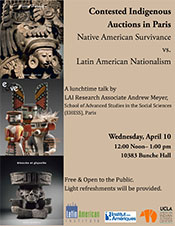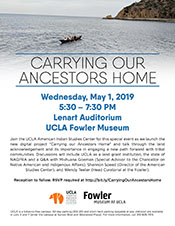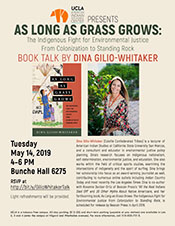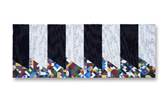Add 'aisclist@aisc.ucla.edu' to your address book to prevent emails from going to your junk folder.

Message from the Director
Chokma AISC friends and family,
We have a lot going on in March! Please see below for exciting announcements and events.
Chipisala'cho!
Shannon Speed
Director, UCLA American Indian Studies Center
Welcoming Joy Holland to UCLA AISC!
The UCLA American Indian Studies Center is pleased to announce that Joy Holland will be joining UCLA as the AISC Librarian. She will be starting on April 1st. We are excited to have Joy on board and part of the AISC family. Please welcome her! Joy Holland is the Executive Director of Kona Historical Society (KHS), a Smithsonian Affiliated Museum and Archive. She has an undergraduate and graduate background in classics, and an MLIS from University of Hawai'i, where her course work and outreach work focused on archives, community information centers, and indigenous librarianship. Joy’s work has included collection management, curatorial, program, and operational oversight. She worked at Hamilton Library at University of Hawai'i in Special Research Collections, previously, and at UCLA and University of Virginia in special libraries and in reference. She has lecture experience in museology, library instruction, and languages, as well as community teaching on topics focused on public history.
|
Calling on UCLA American Indian Studies Alumni
As many of you know, 2019–20 marks the 50th anniversary of the founding of the American Indian Studies Center and the Interdepartmental Program. We are trying to complete a comprehensive history of the center in time for the anniversary. To that end, student workers have interviewed some of the first students and faculty in the program. Now we would like to identify others who were here between 1970 and 2010. If you are interested in being interviewed, or if you know of someone you think we should interview, please email Pamela Grieman at grieman@ucla.edu. For funding reasons, we will first focus on those located closest to Los Angeles, but we are particularly eager to find students who were here during the early days. Thanks so much for your time and consideration! We look forward to hearing from you! Just send an email to grieman@ucla.edu.
|
Inidgenous Environmental Activism
Wednesday, March 20, 2019
12:15–1:30 PM
UCLA School of Law
A panel discussion on Indigenous environmental activism in South and Central America featuring Professor Joe Berra (Clinical and Experiential Project Director, UCLA School of Law), Angela Mooney D'Arcy (Executive Director, Sacred Places Institute for Indigenous Peoples Sustainability Initiative), and Rigoberto Queme Chay (Maya-Kiché leader from Guatemala).
Hosted by the Environmental Law Society and NALSA. Co-sponsored by the UCLA American Indian Studies Center.
.
Contested Indigenous Auctions in Paris: Native American Survivance vs. Latin American Nationalism
|
Andrew will make a comparison between Native American tribes and Latin American nations who have both requested repatriation of Indigenous objects being auctioned in Paris, France. Similar to Native nations in the Southwest United States, countries such as México and Perú have contested sales in Paris and demanded the return of cultural patrimony that left the country illegally. However, there are many differences between the Latin American and Native North American contexts. Unlike how objects are repatriated to specific tribes and religious practitioners in the United States, Pre-Columbian items returned to countries like México are placed in national museums. Contemporary Indigenous peoples in México and Perú rarely request repatriation of objects. Meyer will discuss why this issue is not as prevalent among Indigenous peoples in Latin America and why national patrimony varies in the United States. Co-sponsored by Latin American Institute, Institut des Amériques, American Indian Studies Center.
|
Carrying Our Ancestors Home
Join the UCLA American Indian Studies Center for this special event as we launch the new digital project "Carrying our Ancestors Home" and talk through the land acknowledgment and its importance in engaging a new path forward with tribal communities. Discussions will include UCLA as a land grant institution, the state of NAGPRA and a Q&A with Mishuana Goeman (Special Advisor to the Chancellor on Native American and Indigenous Affairs), Shannon Speed (Director of the American Studies Center), and Wendy Teeter (Curator of Archaeology at the Fowler). Reception to follow. Hosted by the UCLA American Indian Studies Center, Fowler Museum, and Office of the Chancellor.
|
Book Talk: As Long as Grass Grows: The Indigenous Fight for Environmental Justice from Colonization to Standing Rock
The UCLA American Indian Studies Center presents a special book talk with Indigenous researcher, activist, and author Dina Gilio-Whitaker on her forthcoming As Long as Grass Grows: The Indigenous Fight for Environmental Justice, from Colonization to Standing Rock, which "explores the fraught history of treaty violations, struggles for food and water security, and protection of sacred sites, while highlighting the important leadership of Indigenous women in this centuries-long struggle" (http://www.beacon.org/As-Long-as-Grass-Grows-P1445.aspx). Dina Gilio-Whitaker (Colville Confederated Tribes) is a lecturer of American Indian Studies at California State University San Marcos, and a consultant and educator in environmental justice policy planning. Dina’s research focuses on Indigenous nationalism, self-determination, environmental justice, and education. She also works within the field of critical sports studies, examining the intersections of indigeneity and the sport of surfing. Dina brings her scholarship into focus as an award-winning journalist as well, contributing to numerous online outlets including Indian Country Today, and most recently the Los Angeles Times. RSVP at http://bit.ly/GilioWhitakerTalk Hosted by the UCLA American Indian Studies Center. |
Brokering the Sacred: The Ethics of Collecting Native Art
The repatriation of Native arts over a thirty-year period (1990–2020) has demonstrated the sustainability of Indigenous knowledge and survivance strategies. How might this moment speak to the viability of the arts as cultural transmitters rather than solely objects of capital worth? The ethics of collecting are debated by a panel of experts. Participants include Mercedes Dorame, Tongva artist; Andrew Meyer, Visiting Graduate Researcher at UCLA Latin American Institute and Coordinator of the California Hub of the Institut des Amériques; Wendy Teeter, Curator of Archaeology, Fowler Museum; Nancy Marie Mithlo, Professor, UCLA Department of Gender Studies and Matthew Robb, Chief Curator, Fowler Museum. Co-sponsored by the UCLA American Indian Studies Center, the Fowler Museum at UCLA, the UCLA Institute of American Cultures, and the California Hub of the Institut des Amériques. Image Credit: Dyani White Hawk, Stealing Horses Back (detail), 2016. Courtesy of the artist and Bockley Gallery. |
Special AICRJ issue "Settler Colonial Biopolitics and Indigenous Resistance"
The next issue of the American Indian Culture and Research Journal is now available online! Guest edited by René Dietrich, this issue offers a discussion of settler-colonial biopolitics as it targets Indigenous life across a range of transnationally related, yet distinct, sites of colonial settlement, including Australia, El Salvador, the United States, and Canada. It includes a response essay by J. Kēhaulani Kauanui and a conversation with poet Deborah Miranda.
http://www.books.aisc.ucla.edu/books/aicrjv42n2.aspx
Stay Connected with AISC
|
® All Rights Reserved. © UCLA American Indian Studies Center
405 Hilgard Ave., 3220 Campbell Hall, Box 951548, Los Angeles, CA 90095-1548
310.825-7315 | www.aisc.ucla.edu | aisc@ucla.edu

 Wednesday, April 10, 2019
Wednesday, April 10, 2019 Wednesday, May 1, 2019
Wednesday, May 1, 2019 Tuesday, May 14, 2019
Tuesday, May 14, 2019 Wednesday, May 15, 2019
Wednesday, May 15, 2019